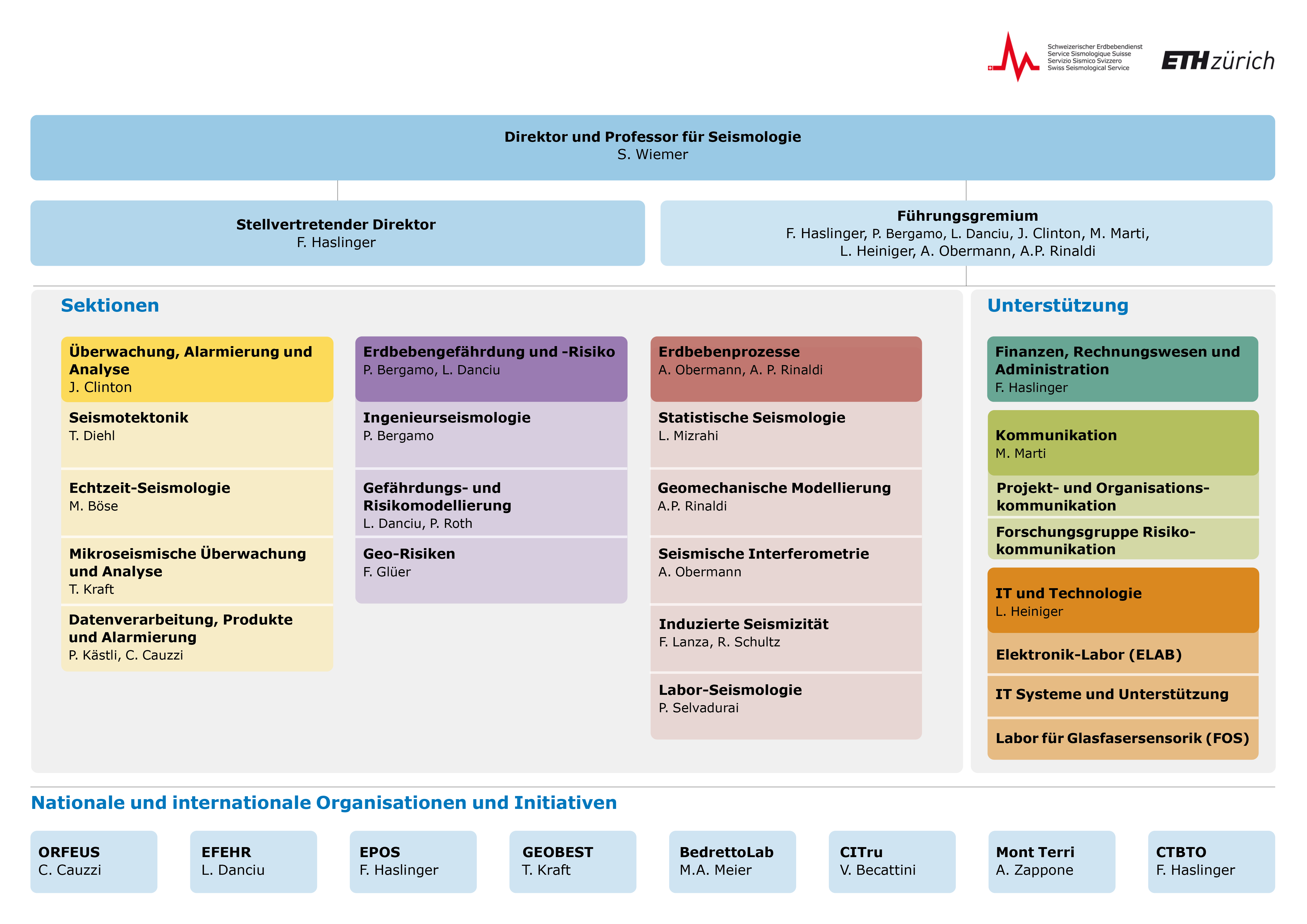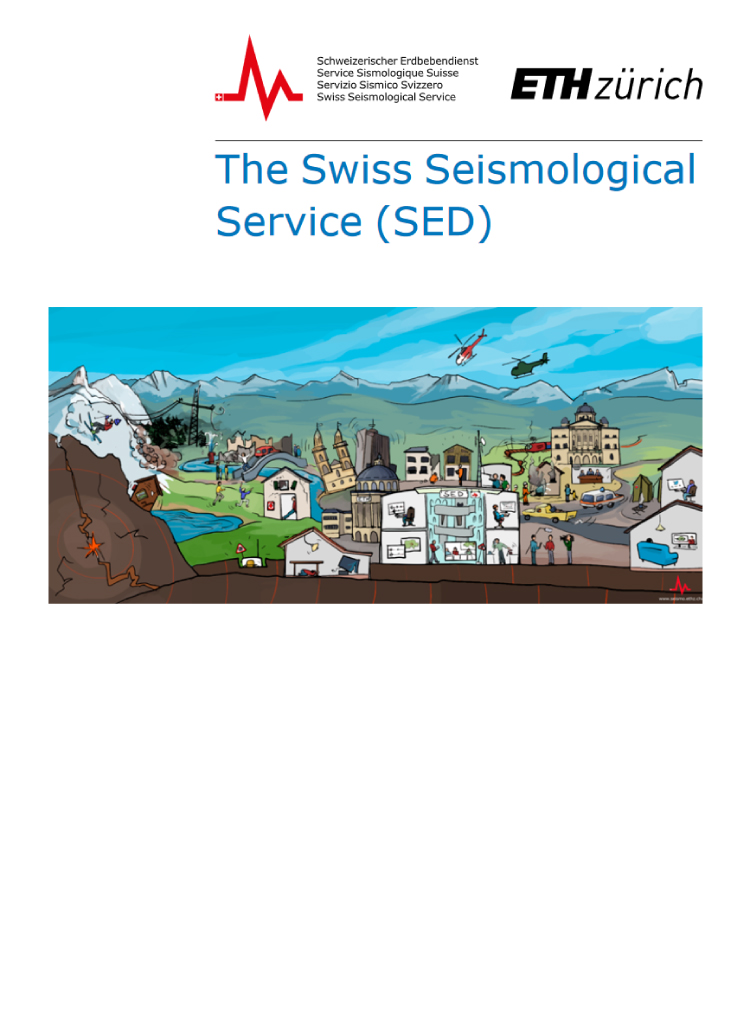The Swiss Seismological Service (SED) at ETH Zurich is the federal agency responsible for monitoring earthquakes in Switzerland and its neighboring regions and for assessing Switzerland’s seismic hazard and risk. When an earthquake happens, the SED informs the public, authorities, and the media about the earthquake’s location, magnitude, and possible consequences. The activities of the SED are integrated in the federal action plan for earthquake mitigation adopted by the Federal Council.
The SED is a nondepartmental unit of ETH Zurich and reports to the Vice President for Research. It works in close collaboration with the Institute of Geophysics and the Department of Earth and Planetary Sciences. The director of the SED, Stefan Wiemer is also a professor of seismology at the Department of Earth and Planetary Sciences.
There are currently approximately 80 people employed by the SED in various capacities, among them around 15 to 20 doctoral students. The majority of these employees are financed by third-party funded projects.
Portrait

The Swiss Seismological Service’s wide range of duties and activities are the result of statutory mandates that are mostly set out in Federal Council rulings. Its main tasks include:
- Monitoring of seismic activity in Switzerland and its neighbouring countries
- Assessment of seismic hazard and risk in Switzerland
- Warning and informing the authorities, the public, and the media
- Teaching at ETH Zurich within the framework of the Bachelor's and Master's programs at the Department of Earth and Planetary Sciences as well as professional continuing education (CAS ETH in Applied Earth Sciences)
- Applied and basic research on a wide range of topics relevant to understanding natural and anthropogenic earthquakes and their consequences
- Swiss involvement in the international monitoring of the nuclear test ban treaty
In addition to these main tasks the SED provides scientific services, runs research programs and does public relations. Knowledge gained by our research efforts and the methods developed in the process are in turn influencing the services offered by the SED.
The Swiss Seismological Service at the ETH is closely associated with the Institute of Geophysics and the Department of Earth and Planetary Sciences at ETH Zurich, but operates as an off-department entity under direct control of the Vice President for Research of ETH Zurich.
The Director of the Swiss Seismological Service, Prof. Stefan Wiemer, is supported by the Deputy Director, Dr. Florian Haslinger. In addition, an executive committee consisting of the different section and unit leaders oversees the various activities of the Swiss Seismological Service.
Monitoring, alerting, and analysis
The section deals with all aspects of network seismology and related science, from earthquake early warning (EEW) to fully curated earthquake catalogues. Its main task is the monitoring, analysis, and documentation of the seismicity of Switzerland. Additionally, the section plans and operates local network densifications near industrial activities that could cause seismicity, such as geothermal projects and tunnel construction, and offers specialised seismicity monitoring and warning. It also provides software for real-time seismology, which is widely used across Europe and worldwide.
Earthquake hazard and risk
The section analyses earthquake hazard and risk in Switzerland. The findings are used, for example, to design standards for earthquake-resistant construction. At the European level, the section is involved in the assessment of seismic hazard and risk and hosts the European Facilities for Earthquake Hazard and Risk (EFEHR). It also deals with earthquake-triggered phenomena such as rockfalls, landslides, soil liquefaction, and lake tsunamis.
Earthquake processes
The section focuses on the fundamental understanding of earthquakes. The focus is on the physical processes around the occurrence of earthquakes, which are investigated both on a laboratory scale and in large-scale projects. Thematically, the section deals with earthquake processes in the fields of geothermal energy, CO2 storage, and underground disposal of nuclear waste. Data are collected, analysed, modeled, and new technologies and instruments are developed.
Support
The section encompasses a wide range of activities in the areas of communication, finance, accounting, and administration as well as IT and technology. It ensures the smooth operation of the SED as a national earthquake service and top-class research institution.
National and international organisations and initiatives
The Swiss Seismological Service (SED) at ETH Zurich promotes and participates in numerous national and international initiatives and long-term projects of national importance.
The remit of ETH Zurich's Swiss Seismological Service (SED) is laid down in the following laws, Federal Council decrees and ordinances:
| 2020 | Federal council resolution of December, 11, 2020, concerning earthquake precaution measures taken by the federal government for the period 2021 – 2024. |
| 2017 | Federal council resolution of June, 16, 2017, concerning earthquake precaution measures taken by the federal government for the period 2017 – 2020. |
| 2015 | On 21 January 2015, the Swiss Federal Council approved the application for Switzerland's participation in the second GEM Working Programme. |
| 2013 | Federal council resolution of January, 30, 2013, concerning earthquake precaution measures taken by the federal government for the period 2013 – 2016. |
| 2010 | Regulation of October 20, 2010, concerning the organization of ABC- and natural disaster operations. |
| 2010 | Regulation of August 18, 2010, concerning warnings and alerts. |
| 2010 | Federal council resolution of May 26, 2010, concerning participation in the international research project “Global Earthquake Model (GEM)“ |
| 2009 | Federal council resolution of February 18th, 2009, concerning the renewal and financing of the Swiss strong-motion monitoring network. |
| 2009 | Federal council resolution of April 1, 2009, concerning earthquake precaution measures taken by the federal government for the period 2009 – 2012. |
| 1996 | Federal council resolution of September 16, 1996, concerning the verification of the Nuclear Test Ban Treaty and cooperation with the CTBTO. |
| 1990 | Federal council resolution of August 29, 1990, concerning the establishment of two national earthquake monitoring networks. |
| 1956 | Federal law (SR 414.113) of December 7, 1956, which established the SED at ETH Zurich and tasked it with monitoring earthquake activity in Switzerland, conducting and publishing research on earthquakes and contributing to international seismological projects. |
| 1914 | Federal council resolution of July 8, 1914, concerning the salary of staff working at the seismological service. |
| 1913 | Federal law of December 19, 1913, concerning the extension of duties of the Swiss Meteorological Service (Meteorologische Zentralanstalt) |
On the basis of these laws and resolutions an agreement between the ETH Zurich, the Department of Earth and Planetary Sciences, and the SED has been reached. This agreement specifies the structure and financing of the SED within the ETH Zurich framework.
SED


